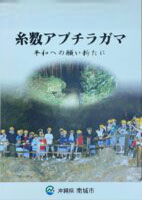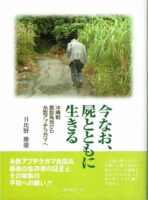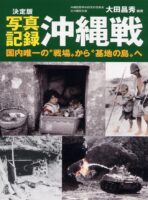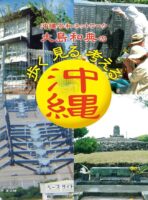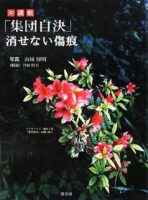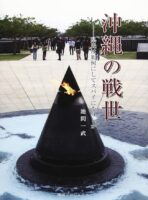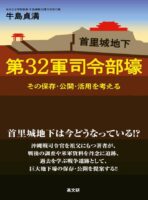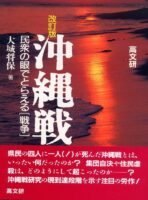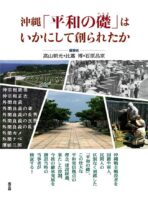Katsuhiro Hibino, Soldier from Aichi Prefecture. Half a Year Surrounded by Corpses
Half a year surrounded by corpses
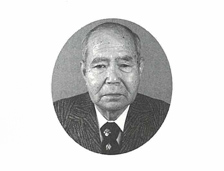
Looking for a Hospital
When I was a squad leader back then, I got my right arm injured on the Ahacha front, near Kakazu, a site of fierce fighting in Okinawa. I was miraculously rescued while I was unconscious. Then, left without sufficient treatment, I moved from the front base to the Oroku infirmary, then the Haebaru military hospital, then the Itokazu branch of the Haebaru hospital, retreating southward from the enemy's attack, and trying to find good nursing.
The pain was almost unbearable, the wound turned septic and got infested with maggots. Eventually, when I arrived in Haebaru, I had tetanus. Although it is known as a fatal disease, the military officer only gave me a cold glance and didn't examine me once. I was ignored, and I had to gather all my mental strength to bear the continuous twitching of my body. I could neither eat nor drink, and the hospital stank, full of flies and fleas.
On May 15th, as the enemy was approaching, the order "to evacuate only those who could be saved" was issued. Of course, I was part of the group to be left behind. At midnight, Okinawa defense conscripts came and carried outside those who could be saved. Although my entire body was twitching and couldn't function properly, I kept secretly thinking: "If I miss this opportunity, people being evacuated on stretchers. I'll never be saved." I had a reckless plan in mind and I was waiting for the right time to try it. We were lying on three-leveled shelves. I was on the second level, at the back of the shelf. Suddenly, I jumped off the shelf with all my strength, aiming at a stretcher that was going past just below me. My fall surprised the trench-carrier on the narrow path, but he went on carrying me outside without a word. I implored that old soldier with one hand: "please help me!"
Ships were continuously bombing the area and the flare bombs turned the night into day. But the old soldier kept taking care of me. In the morning, we came to a cave entrance in a thickly wooded area and he managed to slip into it.
Inside, the cave was twice the size of a tunnel, and hundreds, thousands of stalactites were hanging above us like icicles. Further on, both sides of the path were partitioned, with wooden floors. It was the Itokazu Abuchiragama, located in Itokazu village of Shimajiri county Tamagusukuson (the present Nanjo City Tamagusukuson Itokazu). During the war, it became a military hospital.
Maggots Were Wriggling in the Wound
About then, the war turned into a terrible disaster, and Shuri Castle was already
abandoned. However, shells didn't reach the trench. The tetanus was getting worse and maggots were wriggling in my wound. The pain added to the twitching and I became so weak that I'm surprised I didn't die. A few days after I arrived, we received the following order: "Our hospital will dissolve. Go immediately to Makabe on your own." I stopped thinking "the time has come." Those who couldn't walk crawled out. Everyone's will turned to self-preservation. I was helpless, watching those tragic scenes, calling "Nurse! Nurse!" and begging "Remove the maggots!" A man near me was desperately trying to evacuate. He punched my twitching face. Did he think I was making too much of a fuss? I don't know, but when he punched me, I couldn't help feeling miserable and ashamed.
A lot of people left. Inside, the trench became very quiet. Then, a nurse came and gently shook me. She removed the bandage around my right arm, and started picking away the maggots one by one, with tweezers. My wound looked like it certainly wasn't a suitable job for a young lady, but she moved her hand softly. Her divine profile made her look like "an angel in hell". She left around dawn, she left silently. She just gave me a deeply comforting look. She was a local schoolgirl who worked as a mobilized student and when the hospital was dissolved, she chose me as her last job.
Before the medical officer left his last words were: "Just wait until they come to get you tomorrow." Everybody believed him and waited. And waited. Two days later, three days later, nobody had come for us. People who felt their time coming lost hope and killed themselves, one after another. They died screaming. I thought it was better to rest in peace in the depth of the trench than to be left dying outside, and I gave up trying to survive.
Yoshida’s Death
Suenaga from Kyushu, Yoshida from Tokyo, and Yoshida from Nagano were lying next to me. As I was moaning, Yoshida from Tokyo yelled at me to be quiet and punched me. I was totally dehydrated and as skinny as a dead body, but I couldn't get a sound of water out of my mind and kept thinking: "If I could drink some of that water, I would die with no regrets." But I was unable to move and hearing the sound of water was torture to me. I covered my ear with my left hand but I could still hear the water flowing with my right ear. "Water! Water!" It was driving me crazy. And yet, I'm sure now that this constant focus on water kept me alive.
People around me were loudly ranting and raving, losing their minds, whereas some died quietly, completely unnoticed. In the completely dark trench, where big bats flapped their wings, several days elapsed. I was lying on my back and I suddenly became aware of the cause of the itch. I picked up a big maggot and realized there were plenty of them. Looking around to find out where they came from, I noticed my neighbor Yoshida from Tokyo was dead. His body had already started decaying. I couldn't believe this most vigorous person had died. The smell gave me nausea, but I was sure the man wouldn't punch me anymore. I didn't have enough strength to move away from the decaying body of my neighbor and the maggots, and I was haunted by a terrible thought: "I'll soon be just like him…" Still desperately yearning for water, I thought there wasn't enough moisture left in my dried up body to make urine out of it.
The Underground Water Brought Me Back to Life
I remember a yellow phosphorus bomb was thrown down the air hole, on the other side. There was a big sound and I was blown away. I passed out. When I woke up, I realized the blast blew me down the shelf. And when I finally came to my senses, thinking "Oh! I'm still alive!" I saw I was miraculously lying 5m beneath, next to an underground stream of clear water. I didn't take time to appreciate my joy. I just forgot my pain and kept drinking till my stomach was filled with water. I fell asleep. When I woke up, I drank again and again. I fell asleep again, and drank again and again when I woke up. I was gradually able to move. By "move" I mean I was able to sit up. Suddenly, I realized there was brown rice hidden inside the socks of the dead near me. I took the rice right away and put it in my mouth. Of course I knew my weak body couldn't digest the brown rice. But I filled up my mouth and chewed the rice patiently.
The other men lying on their back were holding up their shoes and camping pots to collect the scarce drops falling from the ceiling. I thought: "Since I was brought back to life by the water, why not share it with everyone?" Realizing how selfish I was, I made up my mind to help the others, a canteen hanging from my neck. Groping my way, I made 10 steps forward. Breathing very feebly, I had to rest a while. I started moving again and it took me a whole day to eventually fill up my canteen. When I handed the water to the most seriously injured man, he raised up his hands in prayer, grasped the canteen, and drank. Even though I asked him to share with the others, he clung to the canteen with all his strength, crying, and thanking me endlessly. When people screamed "Water! Please, some water!" I dragged my body to draw water. This water-drawing became my routine and, thanks to it, my physical strength gradually came back. I forgot about the terrible tetanusand its twitching pain. Did some mysterious power drive death out of me? Or did some miracle bring me back to life? I can't say. I watched my companions dying after drinking a last sip of the water. I knew I might share the same fate, but when their last words were "please take care of everything," I held their hand and said "sure, I will." Sometimes, when I recall my friends' last moments, I can't help crying.
Finding Injections
One day, I found a bag of brown rice, cans, dried miso and a lot of injections. I felt happy and proud and handed injections to everyone. I had no real knowledge of medicines, but I knew about Ringer's solution and camphor I felt happy and proud and gave medicine to everyone. We thought those marked with red letters were powerful drugs, but we swallowed any other ones. If I'd found them a bit earlier, many lives would have been saved. I had nothing but regrets. Under a dim candlelight, while I was watching my companions swallow their drugs in silence, one of them shouted: "When I die, lay a big rice cake and a bowl full of water on our family altar… Please Mom…" It was so pathetic that, later, I gave several camphor injections to his dead body.
The Pleasure of Being Outside
This was the opportunity for us to start a communal fight for survival. The entrance was blocked and just a small air hole was connected to the outside. Inside the trench, we didn't use any lights, unless it was absolutely necessary. We lived in darkness. We took some heat through the lenses and cooked brown rice porridge with sweet potato leaves. That was our big treat to stave off hunger.
When night came, we crawled out of the trench through one of the air holes, just the size of a man, and went searching for food, such as sweet potatoes, leaves, and so on. That was the only pleasant moment of our long trench life. Although danger was everywhere around, we went out every night, getting wet in the fog, touching the weeds, and breathing fully the air that shook the treetops. Only people deprived of the pleasure to breathe free open air could appreciate the taste of it. It was truly delicious. On our way back to the trench, we used to pick up some wild grass. We brought it back as a present to those who couldn't walk. Inside, we spent hours sniffing the grass. We felt we were sucking up its green life. Every day, we depended on these flowers to ease our frustration of being shut in.
Darkness Soothed Our Souls
After being confined for several months in the dark, most of the people died yearning for sunlight and green nature, begging "I want to die worshipping the sun" or "I want to die outside". Those like us who were left alive, felt even more depressed sometimes. When I put the lights on, I saw countless creepy stalactites hanging from the ceiling and pointing at us with the shiny drops at their tips. I saw all the corpses lying everywhere in the dark trench and started wondering again about death. Death was everywhere… I got so scared I blew out the candles. But the hellish vision remained, filling my mind with horror. A child clings to his mother's knees when he is scared. The same reaction lurks in an adult's mind as well. Back then, I often clung to my mother's phantom, asking for help and unconsciously shouting "Mother!" from the bottom of my heart.
Actually, the total darkness inside the trench probably soothed us instead of driving us crazy. Being unaware of Japan's Defeat, I believed we would recover, thinking "Reinforcements will soon be here, and then..." So, I kept enduring an austere thought. In order to survive, we used our ingenuity to maintain our primitive and minimum life: if we ran out of matches, we dried some wormwood to make a rope and lit up the fire with a lens. Yet, dampness remained a problem.
We Decided to Come out of the Trench, Doubting the News of Defeat
Eventually, the victorious day came for the few of us who kept their strength till the end. The autumn wind was blowing when we were finally found. Some Japanese soldiers burst through a secret passage and surprised us. Moreover, we were stunned by the news we heard: "Japan ended the war. All the soldiers can go home." They said they followed our footprints on the potato field and came to call us. We answered: " This crazy news can't be true" and obstinately refused to believe them. They insisted: "Just come outside and listen to us." We decided that I would go out alone, as a representative, and see what would happen. Just in case I was captured by mistake, I hid two grenades in my inside pocket, and followed the men. I was prepared to die, but I was afraid all our hard work until then would go up in smoke.
For the first time in several months, I stood under the blue sky, in the middle of the day. The sun was glaring. I looked over the green mountains. It was more beautiful than the first color movie I saw. I was stunned and speechless, marveling at the vivid scenery. It was the first time in my life I felt green nature was so impressive. I made up my mind: I wanted to live in this light until the end and I decided to leave the trench as soon as I went back to the trench and told the others. I told the translator: "Everybody will come out together." We came out into the light at once, through the narrow entrance. We were happy to be released at last from our long life in the dark, no matter what the situation would be.
When I crawled out of the trench, carrying on my back a man who couldn't walk, I couldn't stop crying, overwhelmed with emotion. It seemed to me it was just the day before I was carried into the trench, and I was happy to leave it rescuing a man.
*apparemment un tranducteur faisant la liaison entre les soldats US et les japonais était présent sur les lieux, mais il a surgit soudainement dans le contexte sans explication
A Tragic War, the Japanese People Should Never Forget
Once everybody was out, we weren't harmed at all. We rode in separate cars waiting for us and were respectively taken to different prison camps. That was almost twenty years ago. On that day, we didn't have time to reply to the following question: "For what sake did we suffer up to now?" We had to split up. We didn't know each other's addresses and we never saw each other again. Yet, I haven't forgotten an ounce of the trench icicles and the faces of many fellow soldiers are burned in my mind. Whenever I see my scars, I remember them. I will never forget.
In the scientific era, that unchanging cave yielded neither to technology nor to any attempt of destruction. That is the everlasting grandeur of nature. It was our ally, protecting weak humans from the war. For over a fortnight, bombs were dropped . People never thought that the severely injured men who took refuge there would survive over six months. Fortunately, miraculously, I survived. But I remember a lot of fellow soldiers who suffered more than I did and passed away. Lonely in the depths of the Okinawa trenches many souls still rest and may never be found. On behalf of them, I can't help screaming "We want the Japanese people to remember this tragic war. "





